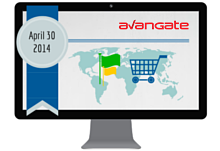Brazil - the next great eCommerce opportunity
|
With a population of 202M and the 6th largest world economy, Brazil accounts for 59% of Latin American eCommerce revenues. World-class technology combined with a market size bigger than UK, Italy, Russia, or India makes Brazil the next great eCommerce opportunity. Ralf Germer, the CEO, of 4M Iberoamérica, shares his insights into Latin America's eCommerce presence - examining market trends, online revenue growth predictions, and key indicators of Brazil's growing market strength. Watch our webinar to find out how to accelerate your online sales by expanding into Brazil's eCommerce market. We'll highlight why Brazil may be the next market you'll want to enter, examine some of the challenges companies face when entering this unique market, and highlight how 2Checkout can help you ramp up fast. Watch this webinar and discover:
|
 |
